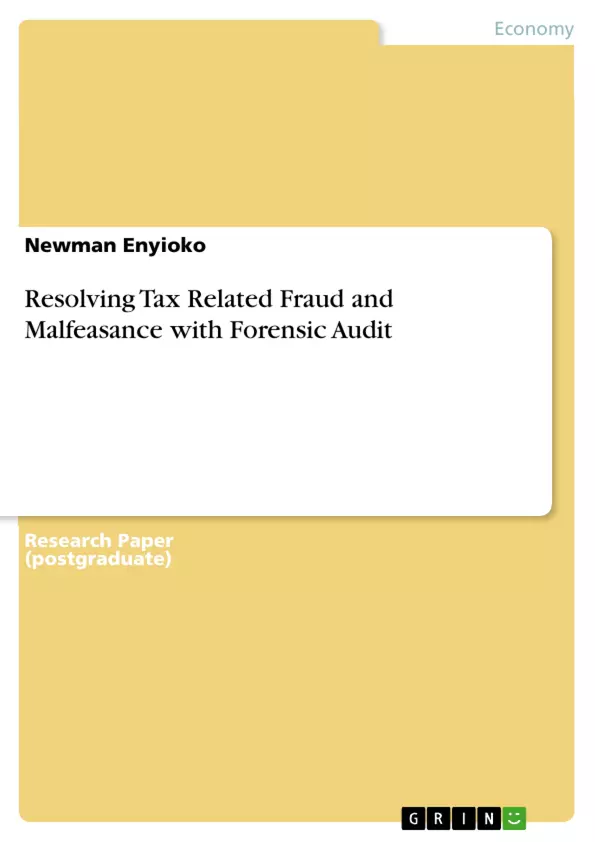This work is a theoretical study on the application of forensic audit and investigation in resolving tax related fraud and malfeasance.
The work aims to examine the application of forensic audit and investigation in combating fraudulent activities in corporate organization, to determine the characteristics required by forensic auditors as to combat fraudulent activities and to differentiate between forensic auditor and financial auditor.
Based on the findings, this work concludes that forensic auditing has improved management accountability, strengthened external auditor’s independence and assisting audit committee members in carrying out their oversight function by providing them assurance on internal audit. Therefore, the study recommends that the service of forensic auditors should be employed in Nigerian organisations.
Inhaltsverzeichnis (Table of Contents)
- Introduction
- Objectives of the Study
- Methodology
- Literature Review
- The Concept of Fraud
- The Concept Misfeasance
- The Concept of Forensic Auditing
- Conceptual Definition of Strategic Tax Behaviors: Tax Evasion, Tax Avoidance and Licit Savings of Taxes
- Activities being carried out by Forensic Auditors
- Responsibilities of Forensic Auditors in combating Fraudulent Activities and Malfeasance
- Detecting Tax related fraud & malfeasance
- Conclusion and Recommendations
- References
Zielsetzung und Themenschwerpunkte (Objectives and Key Themes)
This paper explores the use of forensic audit and investigation in resolving tax-related fraud and malfeasance. It examines the roles of forensic auditors in combating fraudulent activities, the distinction between forensic and statutory auditors, and the impact of forensic auditing on corporate governance.
- The application of forensic audit in combating fraudulent activities in corporate organizations
- The characteristics required by forensic auditors to combat fraudulent activities
- The distinction between forensic auditors and financial auditors
- The impact of forensic auditing on corporate governance
- The role of forensic auditors in detecting and preventing tax-related fraud and malfeasance
Zusammenfassung der Kapitel (Chapter Summaries)
- Introduction: This chapter outlines the growing concern of tax-related fraud and malfeasance within corporations and emphasizes the need for a multi-dimensional approach to corporate governance. It discusses the role of forensic auditors in addressing this issue.
- Objectives of the Study: This chapter outlines the specific objectives of the paper, which include examining the application of forensic audit and investigation, determining the characteristics of forensic auditors, differentiating between forensic and financial auditors, and analyzing the impact of forensic auditing on corporate governance.
- Methodology: This chapter describes the research methodology employed in the paper, which is a theoretical study using secondary data from available literature on forensic auditing and investigations.
- Literature Review: This chapter provides a comprehensive review of the literature on fraud, misfeasance, and forensic auditing. It includes various definitions of fraud and misfeasance from different scholars and organizations.
Schlüsselwörter (Keywords)
The primary focus of this paper lies within the realms of forensic audit, external audit, tax evasion, tax avoidance, fraud, malfeasance, and corporate governance. These keywords encapsulate the core concepts and themes investigated in the work.
Frequently Asked Questions
What is a forensic audit?
A forensic audit is a specialized examination of financial records to derive evidence that can be used in a court of law or for legal proceedings, specifically focusing on fraud and malfeasance.
How does forensic auditing differ from financial auditing?
Financial auditing ensures financial statements are fair and accurate, while forensic auditing is investigative in nature, looking for criminal activity like tax evasion or embezzlement.
What is the role of forensic auditors in tax fraud?
Forensic auditors identify strategic tax behaviors such as tax evasion and illegal tax avoidance by analyzing complex financial data and internal controls.
What are the benefits of forensic auditing for corporate governance?
It improves management accountability, strengthens auditor independence, and assists audit committees in their oversight functions.
Why is forensic auditing recommended for organizations in Nigeria?
The study suggests it is a potent tool to combat growing corporate fraudulent activities and to provide assurance on internal audit systems.
- Quote paper
- Newman Enyioko (Author), 2020, Resolving Tax Related Fraud and Malfeasance with Forensic Audit, Munich, GRIN Verlag, https://www.grin.com/document/537296



